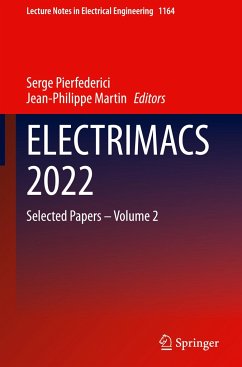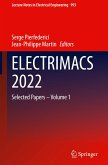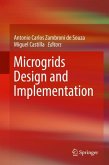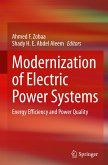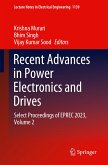ELECTRIMACS 2022
Selected Papers - Volume 2
Herausgegeben:Pierfederici, Serge; Martin, Jean-Philippe
ELECTRIMACS 2022
Selected Papers - Volume 2
Herausgegeben:Pierfederici, Serge; Martin, Jean-Philippe
- Gebundenes Buch
- Merkliste
- Auf die Merkliste
- Bewerten Bewerten
- Teilen
- Produkt teilen
- Produkterinnerung
- Produkterinnerung
This book collects a selection of papers presented at ELECTRIMACS, 2022 the14th international conference of the IMACS TC1 Committee, held in Nancy, France, on 17st-21rd May 2022. The conference papers deal with modelling, simulation, analysis, control, power management, design optimization, identification and diagnostics in electrical power engineering. The main application fields include electric machines and electromagnetic devices, power electronics, transportation systems, smart grids, electric and hybrid vehicles, renewable energy systems, energy storage, batteries, supercapacitors and…mehr
Andere Kunden interessierten sich auch für
![ELECTRIMACS 2022 ELECTRIMACS 2022]() ELECTRIMACS 2022223,99 €
ELECTRIMACS 2022223,99 €![Microgrids Microgrids]() Microgrids160,49 €
Microgrids160,49 €![Microgrids Design and Implementation Microgrids Design and Implementation]() Microgrids Design and Implementation134,99 €
Microgrids Design and Implementation134,99 €![Robust Energy Procurement of Large Electricity Consumers Robust Energy Procurement of Large Electricity Consumers]() Robust Energy Procurement of Large Electricity Consumers86,99 €
Robust Energy Procurement of Large Electricity Consumers86,99 €![Modernization of Electric Power Systems Modernization of Electric Power Systems]() Modernization of Electric Power Systems119,99 €
Modernization of Electric Power Systems119,99 €![Recent Advancements in Materials and Systems for Thermal Energy Storage Recent Advancements in Materials and Systems for Thermal Energy Storage]() Recent Advancements in Materials and Systems for Thermal Energy Storage97,99 €
Recent Advancements in Materials and Systems for Thermal Energy Storage97,99 €![Recent Advances in Power Electronics and Drives Recent Advances in Power Electronics and Drives]() Recent Advances in Power Electronics and Drives134,99 €
Recent Advances in Power Electronics and Drives134,99 €-
-
-
This book collects a selection of papers presented at ELECTRIMACS, 2022 the14th international conference of the IMACS TC1 Committee, held in Nancy, France, on 17st-21rd May 2022. The conference papers deal with modelling, simulation, analysis, control, power management, design optimization, identification and diagnostics in electrical power engineering. The main application fields include electric machines and electromagnetic devices, power electronics, transportation systems, smart grids, electric and hybrid vehicles, renewable energy systems, energy storage, batteries, supercapacitors and fuel cells, and wireless power transfer. The contributions included in Volume 2 are particularly focused on methodological aspects, modelling, and applied mathematics in the field of electrical engineering.
Produktdetails
- Produktdetails
- Lecture Notes in Electrical Engineering 1164
- Verlag: Springer / Springer International Publishing / Springer, Berlin
- Artikelnr. des Verlages: 978-3-031-55695-1
- 2024
- Seitenzahl: 336
- Erscheinungstermin: 29. Mai 2024
- Englisch
- Abmessung: 241mm x 160mm x 24mm
- Gewicht: 613g
- ISBN-13: 9783031556951
- ISBN-10: 303155695X
- Artikelnr.: 69891048
- Herstellerkennzeichnung Die Herstellerinformationen sind derzeit nicht verfügbar.
- Lecture Notes in Electrical Engineering 1164
- Verlag: Springer / Springer International Publishing / Springer, Berlin
- Artikelnr. des Verlages: 978-3-031-55695-1
- 2024
- Seitenzahl: 336
- Erscheinungstermin: 29. Mai 2024
- Englisch
- Abmessung: 241mm x 160mm x 24mm
- Gewicht: 613g
- ISBN-13: 9783031556951
- ISBN-10: 303155695X
- Artikelnr.: 69891048
- Herstellerkennzeichnung Die Herstellerinformationen sind derzeit nicht verfügbar.
Serge Pierfederici received the Dipl.-Ing. from the Ecole Nationale Supérieure d'Electricité et Mécanique, Nancy, France, in 1994, and the Ph.D. degree from the Institut National Polytechnique de Lorraine, Nancy, France, in 1998, all in electrical engineering. Since 2009, he has been engaged as a Full Professor at the University of Lorraine, Nancy, France. He is authored and coauthored more than 200 papers which are published in the international peer-reviewed journals. His research interests include the stability study of distributed power systems, modeling, and control of power electronic systems, and distributed control of multisources and multicarrier microgrids. Dr. Pierfederici was the recipient of several IEEE awards and he serves on the Editorial Boards of the international peer-reviewed journals. Jean-Philippe Martin received the graduation degree in electrical engineering from the University of Nancy, Nancy, France, in 1999 and the Ph.D. degree in electrical engineering from the Institut National Polytechnique de Lorraine (INPL), Nancy, France in 2003. Since 2004, he is an Associate Professor at University of Lorraine and member of the LEMTA since January 2018. His research interests include DC and AC microgrid with centralized or decentralized control, multi-vector microgrid combining electrical, thermal and hydrogen vectors, stability study of distributed power system, static converter architectures and their interactions with fuel cell and photovoltaic system.
Chapter 1. Efficiency maps of synchronous machines based on electrical circuits modelling.- Chapter 2. Losses prediction in the frequency domain for voltage source einverters.- Chapter 3. Online detection of PV degradation effects through ANN Classifier.- Chapter 4. Modeling the non-linearities of charge-transfers and solid electrolyte nterphase resistances for a sodium-ion battery with hard carbon electrode.- Chapter 5. Experimental Development of Embedded Online Impedance Spectroscopy of Lithium-Ion Batteries - Proof of concept and Validation.- Chapter 6. An Improved Maximum Power Point Tracking for Photovoltaic Distributed Energy System associated with a Shunt Active Power Filter.- Chapter 7. Modeling battery aging through high-current incremental capacity features in fast charge cycling.- Chapter 8. Fully decentralized control strategy for synchronous open-winding motors.- Chapter 9. Quasi 3D Reluctance Network Modeling of an Axial Flux Switched Reluctance Machine.- Chapter 10. A Voltage-Controlled Split-pi Converter Interfacing a High-Voltage ESS with a DC Microgrid: Modeling and Experimental Validation.- Chapter 11. Co-simulation domain decomposition algorithm for hybrid EMT-Dynamic Phasor modelling.- Chapter 12. Uncertainties Impact and Mitigation with an Adaptive Model-Based Voltage Controller.- Chapter 13. Consensus-based distributed primary control for accurate power sharing in islanded mesh microgrids.- Chapter 14. Model-free Detection of Distributed Solar Generation in Distribution Grids Based on Minimal Exogenous Information.- Chapter 15. Model-free Detection of Distributed Solar Generation in Distribution Grids Based on Minimal Exogenous Information.- Chapter 16. Load Consumption Characterization and Tariff design based on Data Mining Techniques.- Chapter 17. Energy management system by deep reinforcement learning approach in a building microgrid.- Chapter 18. Passivity based control of two distributed generations in DC microgrid.- Chapter 19. AnImproved Control of High Efficiency Series Converter for Fuel cell/Supercapacitor Hybrid System.- Chapter 20. Photovoltaics at the electric mobility's service: French case study.- Chapter 21. Enhanced performances of the DFIG power control using the exponential reaching law based sliding mode control.
Chapter 1. Efficiency maps of synchronous machines based on electrical circuits modelling.- Chapter 2. Losses prediction in the frequency domain for voltage source einverters.- Chapter 3. Online detection of PV degradation effects through ANN Classifier.- Chapter 4. Modeling the non-linearities of charge-transfers and solid electrolyte nterphase resistances for a sodium-ion battery with hard carbon electrode.- Chapter 5. Experimental Development of Embedded Online Impedance Spectroscopy of Lithium-Ion Batteries - Proof of concept and Validation.- Chapter 6. An Improved Maximum Power Point Tracking for Photovoltaic Distributed Energy System associated with a Shunt Active Power Filter.- Chapter 7. Modeling battery aging through high-current incremental capacity features in fast charge cycling.- Chapter 8. Fully decentralized control strategy for synchronous open-winding motors.- Chapter 9. Quasi 3D Reluctance Network Modeling of an Axial Flux Switched Reluctance Machine.- Chapter 10. A Voltage-Controlled Split-pi Converter Interfacing a High-Voltage ESS with a DC Microgrid: Modeling and Experimental Validation.- Chapter 11. Co-simulation domain decomposition algorithm for hybrid EMT-Dynamic Phasor modelling.- Chapter 12. Uncertainties Impact and Mitigation with an Adaptive Model-Based Voltage Controller.- Chapter 13. Consensus-based distributed primary control for accurate power sharing in islanded mesh microgrids.- Chapter 14. Model-free Detection of Distributed Solar Generation in Distribution Grids Based on Minimal Exogenous Information.- Chapter 15. Model-free Detection of Distributed Solar Generation in Distribution Grids Based on Minimal Exogenous Information.- Chapter 16. Load Consumption Characterization and Tariff design based on Data Mining Techniques.- Chapter 17. Energy management system by deep reinforcement learning approach in a building microgrid.- Chapter 18. Passivity based control of two distributed generations in DC microgrid.- Chapter 19. AnImproved Control of High Efficiency Series Converter for Fuel cell/Supercapacitor Hybrid System.- Chapter 20. Photovoltaics at the electric mobility's service: French case study.- Chapter 21. Enhanced performances of the DFIG power control using the exponential reaching law based sliding mode control.

